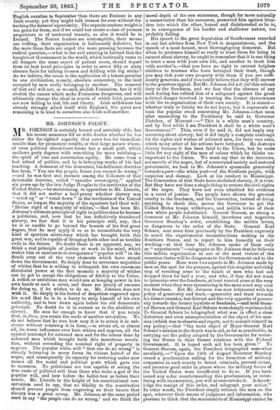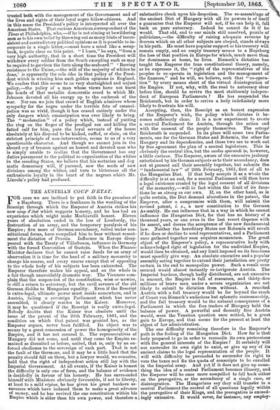MR. JOHNSON'S POLICY.
MR. JOHNSON is certainly honest and certainly able, but
his recent measures fill us with doubts whether he has 'either the far-sighted sagacity that cares less fur immediate results than for permanent results, or that large nature where- of even political shrewdness forms but a small part, which mellows party dogmas with something far more subduing— the spirit of true and unsectarian equity. He camp from a bad school of politics, and he is betraying marks of his bad teaching. A democrat of the democrats, his deliberate doctrine has been, " You are the people, hence you cannot do wrong," —and he was first and sternest among the followers of that detestable doctrine, called "squatter sovereignty," applied six years ego by the late Judge Douglas to the territories of the -United States,—he maintaining, in opposition to Mr. Lincoln, that it did not matter a half-penny whether slavery was " voted up" or "voted down" in the territories of the United States, so longas the majority of the squatters had their will. Divine right of a majority of whites,'—that has been Mr. Johnson's ultimate principle of right in politics since he became a politician, and, now that he has definitively abandoned slavery, we fear that it is his principle still, nay, that he is so unable to go beyond the bounds of his first great dogma, that he may apply it so as to reconstitute the very kind of spurious aristocracy which has brought forth this great war, and is capable of bringing forth other and as terrible 'evils in the future. No doubt there is an apparent, nay, we think a real principle of justice at work in his mind, which makes him so anxious to re-invigorate a "popular will " in the South even out of the very elements which have struck down the Government. So deeply does he reverence majorities of whites that he is willing to relinquish his own enormous dictatorial power at the first moment a majority of whites can be got to accept the obligations of fidelity to the Union. A selfish or ambitious man would aim at keeping power in his own hands at such a crisis, and there are plenty of excuses for doing so, if he wishes to do so. Mr. Johnson does not wish it. So deeply is his hatred of despotism engraved upon his mind that he is in a hurry to strip himself of his own authority, and to bow down again before his old democratic principle. No doubt he is in earnest as to the abolition of slavery. He sees far enough to know that if you retain that, in form, you retain the seeds of another revolution. We do not believe that he sees how easy it is to retain it in sub: stance without retaining it in form,—to retain all, or almost all, its worst influences over both whites and negroes, all the cynical contempt for coloured men and for the labour done by coloured men which brought forth this monstrous revolu- tion, without conceding the nominal right of property in .negroes. The popular white will " that can do no wrong" is already betraying in many forms its vicious hatred of the negro, and consequently its capacity for restoring under new names all the social and political pests which gave rise to secession. No politicians are less capable of seeing the true roots of political evil than those who make a god of the popular will, and bow before the ballot-box as before their oracle. Mr. Lincoln in the height of his constitutional con- zervatism used to say, that no fidelity to the constitution .should prevent people from engraving on their hearts that slavery was a great wrong. Mr. Johnson at the same period used to say the people can do no wrong,' and we think the
moral depth of the one statesman, though far more naturally a conservative than his successor, preserved him against blun- ders into which the other, honest and disinterested as he is, is in consequence of his harder and shallower nature, too probably falling. His speech to the great deputation of Southerners recorded in our last advices from New York is magnanimous, and the speech of a most honest, most thoroughgoing democrat. But when he professes himself so ready to trust them for being in earnest about slavery, he ought to remember that it is one thing to trust a man with your own life, and another to trust him with another's,—that you have no right to entrust helpless children to trustees who have betrayed their trust, though you may risk your own property with them if you are suffi- ciently generous, and if you really believe that they will answer to the generous appeal. But Mr. Johnson did not feel this solemn duty to the freedmen, and we fear that the absence of any such feeling has robbed him of a safeguard against the great political danger involved in trusting the former slaveowners with the re-organization of their own society. It is stated— whether truly or falsely we do not know, but it represents at least the popular creed concerning Mr. Johnson—that soon after succeeding to the Presidency he said to Governor Fletcher, of Missouri :—" This is a white man's country, and by God while I am President it shall be a white man's Government 1" This, even if he said it, did not imply any wavering about slavery, but it did imply a complete contempt for the rights and wishes of coloured men, for their own sake, which many other of his actions have betrayed. He destroys slavery because it has been fatal to the Union, but he cares little for any right of the men of colour which he thinks un- important to the Union. We must say that in the interests, not merely of the negro, but of a renovated society and restored government, we look to Mr. Johnson's spasmodic generosity towards apart—the white part—of the Southern people, with suspicion and dismay. Look at his conduct in Mississippi. The Convention of that State have abolished slavery, it is true. But they have not done a single thing to restore the civil rights of the negro. They have not even admitted his evidence in a court of justice. The people have shown the greatest cruelty to the freedmen, and the Convention, instead of doing anything to check this, moves the Governor to get the United States troops withdrawn, and militia levies of their own white people substituted. General Slocum, as strong a democrat as Mr. Johnson himself, interferes and negatives Governor Sharkey's order, establishing the militia levies, as dangerous to the order of the State. General Karl Schurz, sent some time previously by the President expressly to watch the experimental reconstructions making in the Southern States, and to report to him honestly on their working—at that time Mr. Johnson spoke of them only as " experiments "—telegraphs to Mr. Johnson that he believes this militia organization in one of the most violent of the secession States will be dangerous to the Government and to the public peace. Here were two reports to Mr. Johnson made by men on the spot for the purpose, against this singular and risky step of restoring arms to the hands of men who had not dropped them for half a year, and who, if they did not want to tyrannize over the freedmen, at least wanted arms at the very moment when they were tyrannizing in the most cruel way over the freedmen. But Mr. Johnson was now infatuated with his policy of generosity and trust,—generosity and trust towards his former enemies, but distrust and the very opposite of genero- sity towards the former loyalists or freedmen,—and troth Gene- ral Slocum and General Karl Schurz were sharply reprimanded. To General Schurz he telegraphed what was in effect a clear distortion and even misrepresentation of the object of his mis- sion (which was to observe and report, not to commit himself to any policy)—that "the main object of Major-General Karl Schurz's mission to the South was to aid, as far as practicable, in carrying out the policy adopted by the Government for restor- ing the States to their former relations with the Federal Government. It is hoped such aid has been given !" To General Slocum, again, the President telegraphed somewhat cavalierly,—" Upon the 19th of August Governor Sharkey issued a proclamation calling for the formation of military companies in each county to detect criminals, prevent crime, and preserve good order in places where the military forces of the United States were insufficient to do so. If you have issued any order countermanding this proclamation, or inter- fering with its execution, you will at once revoke it. Acknow- ledge the receipt of this order, and telegraph your action." In other words, the President simply rebukes the men on the spot, whatever their means of judgment and information, who presume to think that the secessionists of Mississippi cannot be
trusted both with the management of the Government and of the lives and rights of their loyal negro fellow-citizens. And in this sense the President's policy is interpreted all over the American States. That carious American correspondent of the Times at Philadelphia, who,—if he is not aiming at bewildering men as to his own belief by throwing out as many hints of incon- sistent and contradictory political opinions as it is possible to in- corporate in a single letter,—must have a mind like a scrap- book, is quite clear on this point. " I learn," he says, "from a very high authority, that in a short time the President will withdraw every soldier from the South excepting such as may be required to garrison the forts along the seaboard." Barring resistance to the Union,—the will of the majority of whites be done,' is apparently the sole idea in that policy of the Presi- dent which is winning him such golden opinions in England. We confess that this seems to us very shortsighted and unjust policy,—the policy of a man whose views have not burst the bonds of that metallic democratic creed to which Mr. Johnson devoted all his energy up to the outbreak of the war. Nor can we join that crowd of English admirers whose sympathy for the negro under the terrible fate of emauci- pation was so vivid, though it has ceased entirely under the only dangers which emancipation was ever likely to bring. The " moderation" of a policy which, instead of putting the ring on the finger of the prodigal son and killing the fatted calf for him, puts the loyal servants of the house absolutely at his disposal to be kicked, cuffed, or slain, on the strictest principle of non-intervention, seems to us of a very questionable character. And though we cannot join in the absurd cry of treason against an honest and devoted man who is simply unable to realize that the Government has any duties paramount to the political re-organization of the whites in the seceding States, we believe that his sectarian and dog- matic democracy will, if pursued, sow the seeds of new divisions among the whites, and turn to bitterness" all the enthusiastic loyalty in the heart of the negroes which Mr. Lincoln's policy had produced.































 Previous page
Previous page